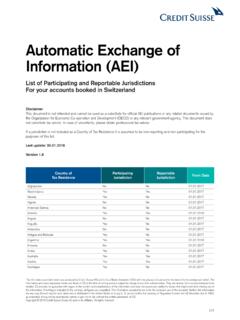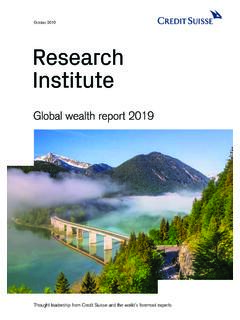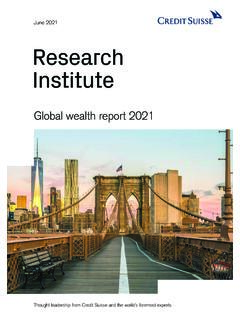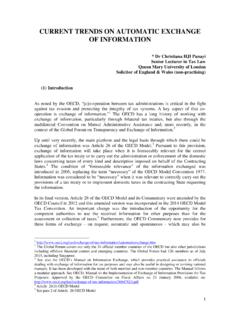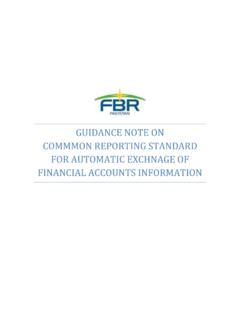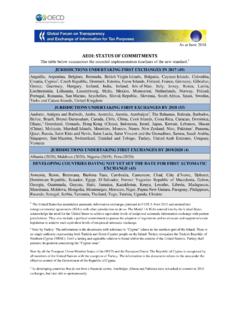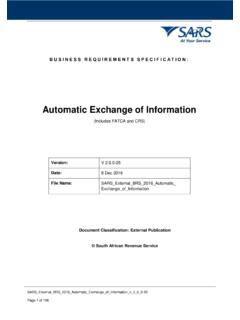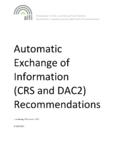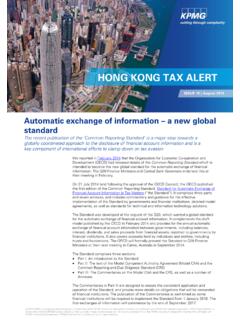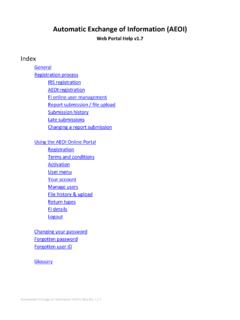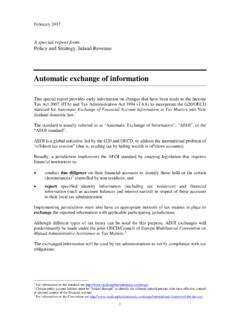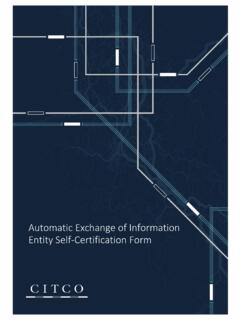Transcription of Automatic Exchange of Information (AEI) Glossary
1 March 2018 Automatic Exchange of Information (AEI) Glossary 2 The Information provided herein was produced by Credit Suisse Group AG and/or its affiliates (hereafter CS ) with the greatest of care and to the best of its knowledge and belief. It may not be reproduced, neither in part nor in full, without the written permission of CS. Copyright 2018 Credit Suisse Group AG and/or its affiliates. All rights Exchange of Information GlossaryTermDefinitionAAccount HolderThe term Account Holder means the Person listed or identified as the holder of a Financial Account by the Financial Institution that maintains the account. A Person, other than a Financial Institution, holding a Financial Account for the benefit of another Person as agent, custodian, nominee, signatory, investment advisor or intermediary, is not treated as holding the account for purposes of the Common Reporting Standard.
2 In this case such other Person is considered the Account Holder under the NFEThe term Active NFE includes any NFE that is:(i) A Publicly Traded Non-Financial Corporation(ii) A Non-Financial Corporation which is a Related Entity of a Publicly Traded Corporation; (iii) A Governmental Entity(iv) A Central Bank(v) An International Organization(vi) An Active NFE by Reason of Income and Assets;(vii) A Non-Profit Organization;(viii) A Holding NFE that is a Member of a Non-Financial Group;(ix) A Treasury Center that is a Member of a Non-Financial Group;(x) A Start-up NFE(xi) An NFE that is in Liquidation or Emerging from Bankruptcy(xii) An Entity wholly owned by a Governmental Entity, Central Bank, orInternational Organization.
3 (xiii) A Related Entity (that is not a Corporation) of a Publicly Traded CorporationActive NFE by Reason ofIncome or AssetsAn NFE qualifies as an Active NFE by Reason of Income and Assets , if less than 50% of the NFE s gross income for the preceding calendar year or other appropriate reporting period is Passive Income and less than 50% of the assets held by the NFE during the preceding calendar year or other appropriate reporting period are assets that produce or are held for the production of Passive launderingAML/KYC ProceduresThe term AML/KYC Procedures means the customer Due Diligence procedures of a Reporting Financial Institution pursuant to the anti-money laundering or similar requirements to which such Reporting Financial Institution is subject.
4 These procedures include identifying and verifying the identity of the customer (including the beneficial owners of the customer), understanding the nature and purpose of the account, and ongoing ContractThe term Annuity Contract means a contract under which the issuer agrees to make payments for a period of time determined in whole or in part by reference to the life expectancy of one or more Value InsuranceContractThe term Cash Value Insurance Contract means an Insurance Contract (other than an indemnity reinsurance contract between two Insurance Companies) that has a cash BankThe term Central Bank means an institution that is by law or government sanction the principal authority, other than the government of the Jurisdiction itself, issuing instruments intended to circulate as in CircumstancesA Change in Circumstances includes any change that results in the addition or change of Information relevant to a Person s CRS status ( Jurisdiction(s) of Residence for tax purposes).
5 In addition, a Change in Circumstances includes any change or addition to the Account Holder s account(s).3 The Information provided herein was produced by Credit Suisse Group AG and/or its affiliates (hereafter CS ) with the greatest of care and to the best of its knowledge and belief. It may not be reproduced, neither in part nor in full, without the written permission of CS. Copyright 2018 Credit Suisse Group AG and/or its affiliates. All rights identificationCommittee on Fiscal AffairsOECD s Committee on fiscal affairsCommon ReportingStandard (CRS)The Common Reporting Standard (CRS) is a worldwide Information -gathering and reporting requirement for financial institutions, to help fight against tax evasion and protect the integrity of tax AuthorityEvery AEI Participating Jurisdiction defines a single authority ( HM Revenue & Customs for the UK) which Exchange with the Competent Authority in another Participating Jurisdiction the required PersonsThe term Controlling Persons means the natural persons who exercise control over an Entity In the case of a trust (and similar legal arrangement such as foundations)
6 , the term Controlling Persons means the settlor(s), the trustee(s), the protector(s) (if any), the beneficiary(ies) or class(es) of beneficiaries, and any other natural person(s) exercising ultimate effective control over the trust (or, in case of a similar legal arrangement, any natural person in an equivalent position). The settlor(s), the trustee(s), the protector(s) (if any), and the beneficiary(ies) or class(es) of beneficiaries, must always be treated as Controlling Persons of a trust, regardless of whether or not any of them exercises control over the guidance might stipulate an alignment between AEI and the applicable AML/KYC procedures. , according to AEI guidance in Switzerland the scope of Controlling Persons includes certain natural persons as identified on forms A, K, S or T in accordance with the agreement on the Swiss bank s code of conduct with regard to the exercise of due diligence (CDB).
7 Curing ProcedureAccording to the Due Diligence review on Pre-existing Individual Account relationships, certain Indicia for potential Jurisdictions of Residence for tax purposes could be discovered . The Curing Procedure will define the way a client is able to claim and/or rebut a specific CRS status by handing in additional documentation ( a Self-Certification and/or Documentary Evidence).Custodial AccountThe term Custodial Account means an account (other than an Insurance Contract or annuity contract) that holds one or more Financial Assets for the benefit of another InstitutionThe term Custodial Institution means any Entity that holds, as a substantial portion of its business, Financial Assets for the account of Master FileA Customer Master File includes the primary files of a Reporting Financial Institution for maintaining account holder Information , such as Information used for contacting account holders and for satisfying AML/KYC AccountThe term Depository Account includes any commercial, checking, savings, time, or thrift account, or an account that is evidenced by a certificate of deposit, thrift certificate, investment certificate, certificate of indebtedness.
8 Or other similar instrument maintained by a Financial Institution in the ordinary course of banking or similar InstitutionThe term Depository Institution means any Entity that accepts deposits in the ordinary course of banking or similar EvidenceThe term Documentary Evidence is used within the Due Diligence procedure and includes any of the following: a) a certificate of residence issued by an authorized government body of the Jurisdiction in which the payee claims to be a resident,b) with respect to an individual, any valid identification issued by an authorized government body, that includes the individual s name and is typically used for identification purposes. c) with respect to an Entity, any official documentation issued by an authorized government body that includes the name of the Entity and either the address of its principal office in the Jurisdiction in which it claims to be a resident or the Jurisdiction in which the Entity was incorporated or organized.
9 D) any audited financial statement, third-party credit report, bankruptcy filing, or securities regulator s Information provided herein was produced by Credit Suisse Group AG and/or its affiliates (hereafter CS ) with the greatest of care and to the best of its knowledge and belief. It may not be reproduced, neither in part nor in full, without the written permission of CS. Copyright 2018 Credit Suisse Group AG and/or its affiliates. All rights AccountAn account (other than an Annuity Contract) is according to CRS a Dormant Account if a) the account holder has not initiated a transaction with regard to the account or any other account held by the account holder with the Reporting Financial Institution in the past three years; b) the account holder has not communicated with the Reporting Financial Institution that maintains such account regarding the account or any other account held by the account holder with the Reporting Financial Institution in the past six years.
10 And c) in the case of a Cash Value Insurance Contract, the Reporting Financial Institution has not communicated with the account holder that holds such account regarding the account or any other account held by the account holder with the Reporting Financial Institution in the past six years. In addition, local regulation might foresee other triggers for treating accounts as DiligenceThe CRS contains the Due Diligence rules for Financial Institutions to follow to collect and then report the Information , that underpin the Automatic Exchange of financial Information . The Due Diligence procedure are designed to identify accounts which are held by residents of Participating Jurisdictions. There are different rules for accounts held by Individuals and Entities as well as for Preexisting and New Accounts, reflecting the differing characteristics between the different types of Record SearchReview of Electronically searchable Information /Data maintained by the Reporting Financial Institution for any Indicia indicating that the Account Holder is resident for tax purposes in a Reportable searchableInformation/DataThe term Electronically searchable Information /Data means Information that a Reporting Financial Institution maintains in its tax reporting files, Customer Master Files, or similar files.
